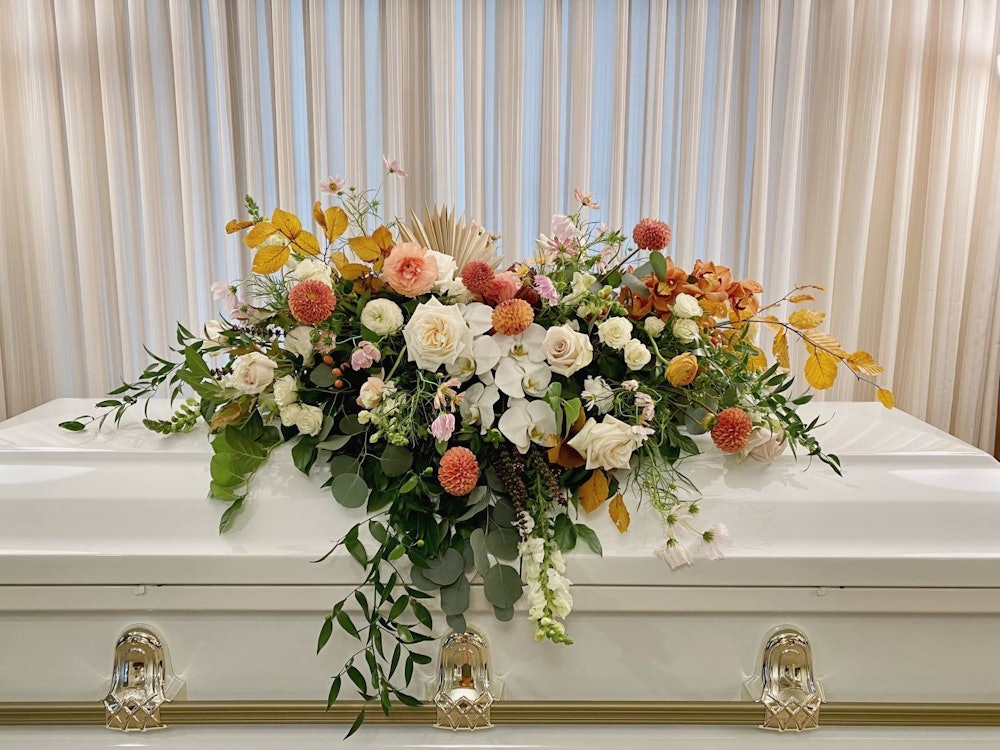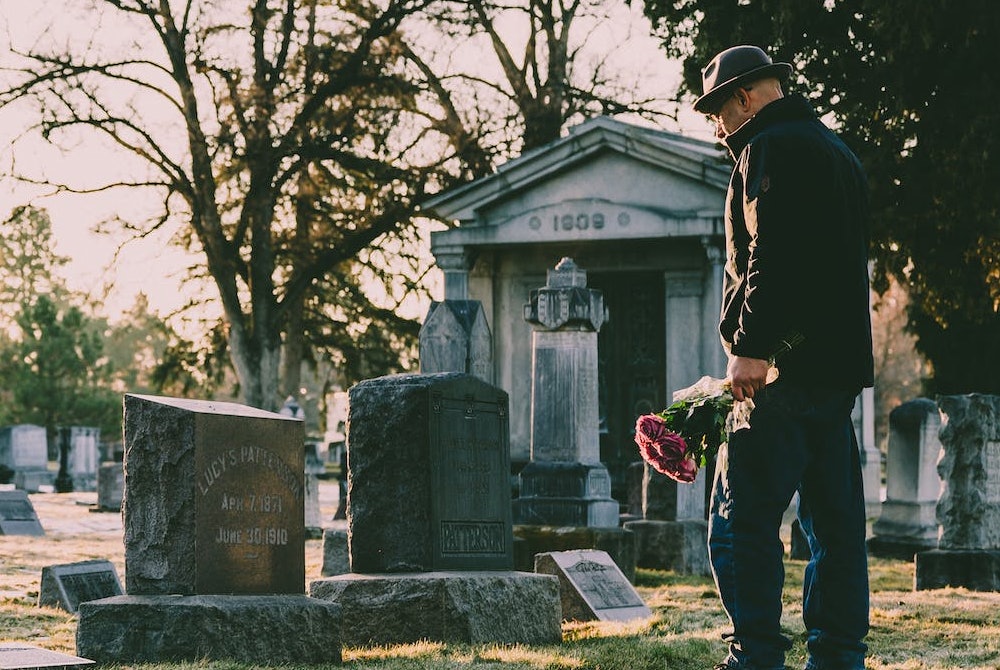- Are Funeral Customers Taken Advantage Of?
- Costs & Price Ranges at Funeral Homes
- What is The Funeral Rule?
- Information You Should Receive From Funeral Homes
Organising a funeral is a process filled with raw emotions and time pressures. When the time comes, consumers are largely unfamiliar with funeral homes and the multi billion dollar funeral industry (which has been the subject of many FTC fines, and is largely self regulated, and still failing spot checks).
Let's get to the most important question first. How much is a funeral?
2023 Funeral Price Survey Results
The median price for a funeral in 2023 was $8,300. This price does not include burial plot or internment. Cremation is typically cheaper, with direct cremation being the cheapest option. All up, you are likely going to spend between $6k and $14k for the majority of funeral home services through to the final internment / resting place.
The price of the median funeral is now $8,300 - this price does not include the cost of the burial plot or internment.
- National Association of Funeral Directors 2023
It's a lot of money. If you find some ways to lower the cost (shopping online for your own casket and urns etc.), the costs still add up in other unfamiliar places like transport, length of refrigeration, viewings, body transfers and other add-on fees.
Funeral homes are businesses that operate for profit and work towards a dollar amount of average revenue per funeral. It is in their best interest for that average revenue to be going up instead of down (as much as that is at odds with the grieving customer). However, funeral shoppers are vulnerable and this guide will help break down the process to help decision makers understand the process and their rights.
Are Funeral Customers Taken Advantage Of?
Some customers report being dissatisfied with the pricing process from funeral homes. Funeral service prices are hard to find online and if they are published, they are published in 'starting ranges' and hard to pin down.
This is in contrast to the other transparent markets we have come to know and enjoy online, like shopping for flights, hotels, phone plans or TVs.
In highly efficient markets, the customer is educated and has fast / widely available price transparency to make informed decisions.
The funeral home market is not one of those highly efficient markets.
Additionally, in efficient markets, consumers improve their shopping skills with the number of times that they go through this process (think of buying groceries). Funeral homes rarely get frequent repeat decision makers within a year.
Unfortunately, the funeral industry has the perfect recipe for the consumer to be disadvantaged. These ingredients are:
- Lack of Knowledge: Organizing a funeral is not a common skill we use every day. To the decision maker in the funeral process, it is a new and confusing field where the organizer has little experience and where they want to 'do right' and 'honor' the deceased.
- Time Pressure: There is a time pressure on the customer to quickly lock in a date and provider to be able to send invitations.
- Vulnerability: The decision maker is often distraught and grieving and not in their sharpest shopping frame of mind.
- Lack of transparency: There are a lack of online tools to view funeral home prices and compare options. Over 60% of funeral homes don’t provide prices online.
Organizing a funeral today is at odds with the modernisation we've seen in every industry -- the internet is not going to be very helpful with funeral home shopping.
As a consumer, you do have some rights.
The 'Funeral Rule' from the FTC means that funeral homes are required to tell you their prices....
But, only in person or via the phone.
So, you’ll need to get in your car to exercise these rights. A funeral home is required by the FTC to provide prices by phone or in person, but not online.
And, in the most recent mystery shop by the FTC, 15% of funeral homes even failed to even provide prices over the phone when asked directly to do so. You will need to visit each funeral home in person to try and get an accurate price. Shopping around will take considerable time.
For sceptics and industry insiders, they don’t love the process of consumers visiting the funeral home in person as they say that sitting down with a funeral home director is just giving someone more of an opportunity to upsell you.

Costs & Price Ranges at Funeral Homes
When providing a general price list, Funeral Homes will break out their funeral packages into a basic service fee (mandatory), and a range of options. It is import to look beyond the basic service fee as many of the options are going to be required if you are actually organize a funeral as the basic service fee is just the start of the contract.
Most basic service fees start around $3k but the median price for a funeral is $8,300 so the options all add up.
During the grieving process it feels cheap and ungrateful to say no to dignified options as they will be presented to the decision maker in a way that makes the decision maker want to say 'yes'. When a funeral home uses words like 'we recommend' or 'almost all of our clients select this option' it puts pressure on the decision maker not to cheap out.
For example, a viewing might seem like 'should have' item that the decision maker is unsure about. The decision maker might have a feeling that some relatives might like option that so the decision maker selects that option. However, a 'viewing' can add up to over a thousand dollars, with body preparation fees, viewing room set up fees, room booking fees, viewing attendant fees, etc.
Some of the common costs that make up a funeral home invoice are:
- Basic service fee - staff and general overhead and use of the funeral home
- Transport of the body
- Preparation of the body
- Purchase of the casket
- Visitation costs set up and staffing costs
- Celebration service
- Burial or cremation costs
- Urns and container costs
- Service at burial site costs
- Form completions and lodgements
Funeral homes are businesses and although consumers might be organising their first funeral, the funeral home will have been through this hundreds of times -- they have already thought of everything, how to present each option to you as the decision maker, and how it can be priced so that each funeral is profitable to the funeral home.
Dealing with the funeral home industry might not feel like the warm embrace you need when you have to deal with the death of a loved one, even though a warm embrace is exactly what consumers need at their most vulnerable.
Some consumers report an opaque and confusing pricing process with some disputes between funeral providers over final prices and funeral homes even withholding remains over disputes. Negatives can include a lack of transparent pricing through to spiralling costs of add-ons and upsells which were not discussed or not asked about.

What is The Funeral Rule?
Funerals are the final step of a traumatic event.
They are an emotional send off for loved ones.
As such, funerals are outlier events in our lives and don't get the same reviews, feedback, and online ratings that we see in other service industries.
There is so much to finalize in a short period of time and it is so traumatic that funeral homes barely get the review scrutiny that an Amazon purchase might get. This allows for funeral homes to easily fend off complaints as they don't need to earn repeat customers in the same way many other service businesses have to.
There are many great funeral homes in the US. However, the FTC has also issued many fines in the industry and the FTC is hardly regulating every funeral home--their most recent check only include a phone survey of 250 funeral homes (there are over 11,000 in the US), and of that, 39 of the 250 recently checked (15%) failed their compliance check against the Funeral Rule.
Introduced in 1984, and totally out of date (as it does not specify that prices must be displayed online) the Funeral Rule from the Federal Trade Commission specifies:
- Funeral homes need to be transparent about pricing - they need to provide consumers with a General Price List (GPL) and the items / services need to itemized in advance
- Consumers have the right to select only the services that they want and can't be forced into services like embalming
- Funeral homes can't force people into purchases for services they don't need
- Casket prices and burial container prices need to be provided to the consumer
- Consumers need to be able to select and source their own casket and urns and be able to provide this to the funeral home
- Embalming is only required in special cases and is not a mandatory.
However, to receive the General Price List, the FTC's Funeral Rule specifies that there are two ways that the Funeral Home must provide this to the customer:
- The price list must by provided to the customer by phone or direct visit
- The price list does not need to be provided if customer asks for it via mail, email
- Funeral homes are not required to publish the general price list online
Information You Should Receive From Funeral Homes
When you do call or visit a Funeral Home to discuss a funeral, it is important to receive a physical copy of the General Price List.
The price list must include the following itemized prices. It is your right as a consumer to see this list and for you to be able to be able to select options from this price list to get the correct funeral for your needs.
Funeral Homes - General Price List Requirements
- Basic service fees that form the basis of the contract including fees for the funeral director and staff
- Prices for forwarding or receiving of remains to/from another funeral home and or any other transfer fees
- Prices for direct cremation or immediate burial
- Transfer of remains to funeral home
- Embalming prices and the option to not choose this process
- Other fees for the preparation of the body
- Use of facilities and staff for viewing
- Use of facilities and staff for funeral ceremony
- Use of facilities and staff for memorial service
- Use of equipment and staff for graveside service
- Hearse or limousine prices
- A casket price list
- Price list if you plan to provide your own casket
- An Outer Burial Container Price List for urns and other containers
- Price list if you plan to provide your own Outer Burial Container
General Price List - Remember Your Rights!
- It is your right to receive a general price list over the phone or from an in-person visit.
- When you have selected the items from this the list from the Funeral Home, request a formal quote with names, dates , addresses as an actionable document to match to your final invoice
- Do not just discuss general prices and then wait for a surprise invoice at the end of the funeral
- You must see the break out of the basic service fees, staff fees and the fees of the funeral director in the Price List
- You must understand any time frame (refrigeration) and transport costs
- You must understand the process at the end of the funeral and where the casket / remains are to go.
The process of organizing a funeral is complex, emotional and hurried. It is important to try to remember and understand your rights and to request transparency from the funeral home in advance. If the funeral home refuses to be transparent with you, they might not be the best fit for your funeral service.











Comments